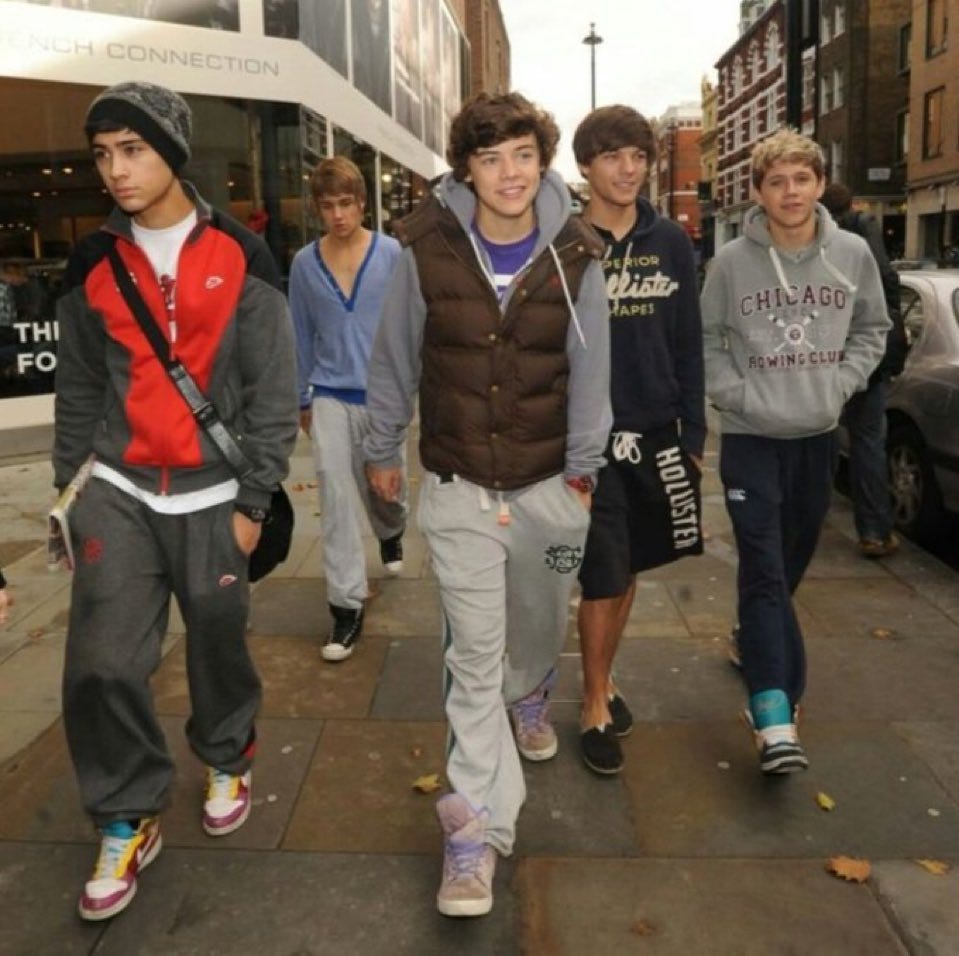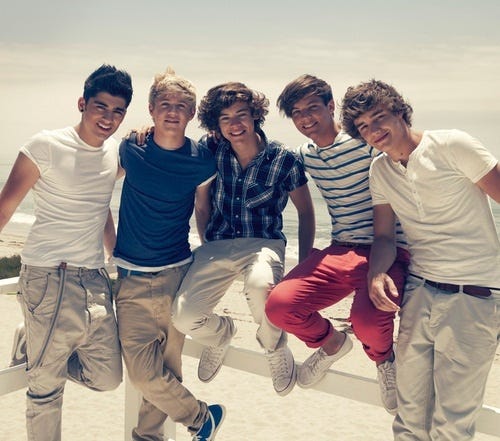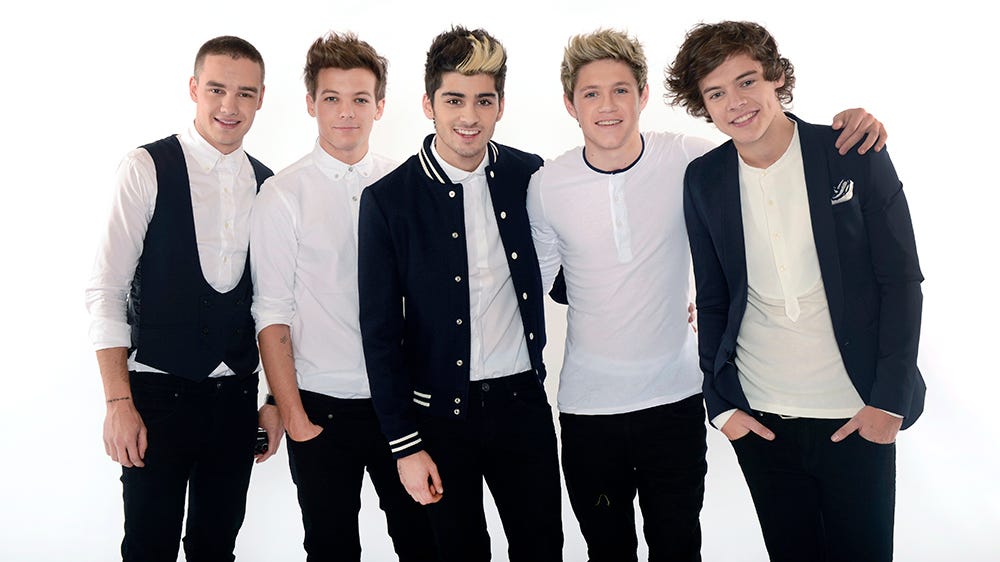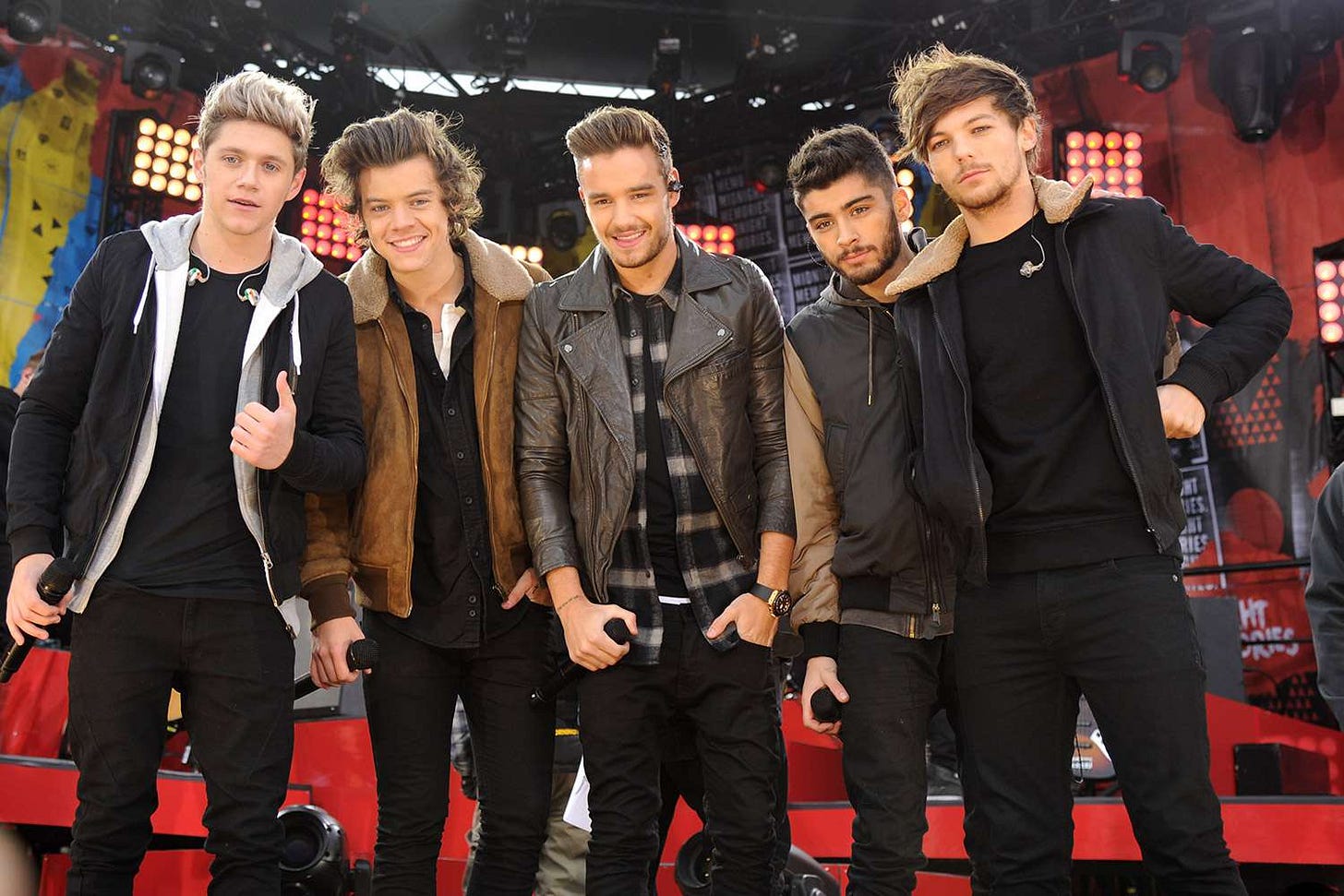I Turned 30, Liam Payne Died
On my 30th birthday (October 16, 2024), Liam Payne of One Direction died. He fell off a balcony in Buenos Aires while extremely intoxicated, drunk and on several drugs; he died on the spot, leaving behind a 7-year-old son, Bear, a family, and millions of grieving fans. In 2022, in an objectively disturbing interview with Logan Paul, Liam said, “How do you go from there? I still don’t know who I am. I replicate different people on a daily basis.” Who really is Liam Payne? I don’t know and now, we’ll never find out
I’ve been thinking a lot about Liam since his death, not because Liam was my favorite (that would be Harry) or because I paid much attention to the band after their first album (Up All Night), but because it hit me like a ton of bricks that this man, who was once a boy I used to watch YouTube videos of lying on the floor of my childhood bedroom, was no longer on this earth. Maybe he deserved it, maybe it was even his own fault, but it’s a tragedy all the same.
I first came across One Direction in 2011 when I was in high school, they’d just lost the X-Factor, and hadn’t even debuted in the United States yet. I was at the zenith of my teen angst and they were irreverent and funny, caught somewhere between boy and man, and I was charmed. It wasn’t as if their music was the greatest thing ever, but it was engaging and entertaining and most of all, a distraction from my worst self. I wasn’t ever really involved in the fandom, but I lurked, especially at the beginning of the trajectory of their celebrity. And then, “What Makes You Beautiful” came out, it hit American airwaves, they played at the 2012 Olympics Closing Ceremony, and the rest was history.
Part of the band’s appeal is that they were just abysmally media trained, especially at the beginning, and it showed. They stuck their feet in the mouths constantly (mostly in endearing ways), and they were pretty obviously in over their heads. A viral tweet from the last week was whether One Direction was genuine or manufactured, and whether they were or weren’t girlhood coded, and personally, I don’t think those concepts are mutually exclusive. Obviously, One Direction the entity was the creation of Simon Cowell and his team, but at the end of the day, the band wouldn’t have made it big without those five boys, now men, now only four (which is just one reason I’m glad it’s the boys and not Cowell who own the trademark). Were or are they perfect people? Of course not, to say the least. But, they’re human and I don’t think they ever lost it, possibly to their detriment.
From the perspective of a 30-year-old, there were so many red flags, so many alarming things about One Direction’s initial catapult to fame and the boys themselves. I understand the argument that we shouldn’t turn teenagers into megastars in the first place, and it seems as if the most troubling aspects of One Direction were brushed under the rug as quickly as possible and nobody, except the boys themselves, realized their magnitude. I didn’t pay any attention to the boys’ lives or careers after they disbanded (I couldn’t recognize a single one of their solo songs, not even Harry’s) or even for years prior, but I caught up on the stories that weighed them down, the ones I didn’t remember, and it just made me sadder and sadder.
Why was Harry dating 32-year-old Caroline Flack when he was 16? Why did Zayn get engaged to Perrie Edwards (of Little Mix) before he could even legally drink in the United States and was accused of assaulting his partner’s mother? Why did Liam have a child with Cheryl Cole (of Girls Aloud), who first called him handsome when he was 14 and she was 24? Why did Louis’ little sister commit suicide when she was only 18 years old? Not for nothing, I sincerely hope that the boys went through extensive therapy and with the exception of Liam, I’d like to think that they have.
Harry Styles and Niall Horan seem to have avoided the worst of the One Direction curse and it’s no coincidence that they have the most successful solo careers, especially Harry who won a Grammy for Album of the Year in 2023. Louis, Zayn, and Liam’s lives have been more tumultuous after the band ended. After Zayn’s engagement with Edwards fell apart, he had a long-term relationship with Gigi Hadid and they had a daughter, Khai, but they broke up, allegedly after after Zayn assaulted Gigi’s mother, Yolanda Hadid. Louis had a son with a stylist, Briana Jungwirth, in 2016 and shares custody with her, was in an on-again, off-again relationship with Eleanor Calder for over a decade, and his younger sister committed suicide in 2019. However, of the five, Liam had arguably the toughest time of the five with global superstardom and its aftermath.
In addition to his well-documented struggles with substance abuse and his tumultuous relationships with women, prior to death, Liam was accused of domestic violence by his ex-girlfriend Maya Henry, she placed a cease-and-desist against him, and a number of women came forward with accusations he mistreated them. My first thought when I heard Liam died is that his son will always have to hear about his father’s death in the same sentence as the violence he enacted on innocent women. It’s fundamentally impossible to extricate the tragedy of Liam’s death from the pain he caused others, but maybe that’s just how people are, complicated and contradictory, victimized and victimizing.
There’s no way to neatly detach the mourning of a person present in every scene of the memory reel playing through our minds from the person he was outside of our lens of fandom — someone who was sued by his ex-fiance for harassment and accused of domestic violence in that same relationship. Someone who struggled with substance abuse at the height of the fame that we gave him. There isn’t a single combination of the correct words to truly communicate the source and feeling of this aching sadness unless it has burrowed into your chest, too. If it has, you don’t need them.
As I noted earlier, I turned 30 the day Liam Payne died.
Long-time friends and readers know that I’ve been … negotiating my mortality for as long as I can remember. I joke about my minor (occasionally major) obsession with my own death, not even in a coping mechanism way, I do genuinely find it amusing, but it’s still real and weighs down on me more than most people realize. When I was younger, I used to conceptualize my death in elaborate ways, the nature of the funeral proceedings, the eulogies people would give, the color of the ink I’d use to write my last notes to the people I loved. I didn’t think I would make it to 30, not because I actively planned to die but because I just couldn’t imagine myself living past my 20s.
It isn’t unique for women to struggle with aging because women’s youth and beauty is a source of power, however ephemeral it may be, and it is genuinely upsetting to have it stripped away from you through no fault of your own. But personally, my fear of aging has always been different, and arguably more sinister. I’m kind of vain, and self-aggrandizing to a fault, fixated on my appearance and my perceived and actual flaws, but the source of my fear of aging is rooted in fearing what comes after the dust settles on my decision to stay alive, an apprehension towards the unknown.
Moreover, while I’m not alone in my death fixation, throughout my extensive reading, I’ve noticed that most women are averse to talking about their mortality in the way that I do, and I think there’s a very gendered stigma to it. Not to overgeneralize but I feel like it’s more socially acceptable for women to be suicidal due to melancholia than suicidal due to anger or confusion or perhaps most damningly, logic. The reality is that there isn’t a point to life, individuals are ultimately unimportant in the grand scheme of things, and despite that, you have to choose to stay alive, and that’s a painful contradiction to accept.
In a sense, this sentiment is very Hamletian. In the hashtag legendary “To Be or Not To Be” soliloquy I had to memorize for 12th grade AP Literature (and still remember in full 13 years later), Hamlet considers whether it’s nobler to live or to die, to endure this mortal coil or to abscond to the undiscovered country of the world beyond it.
Nowadays, I’m no longer considering let alone anticipating my death, not anytime soon anyways, even though I have days in which I get existential about my survival. The thing that brought me out of the brink is the realization that death is so very final, there’s nothing that comes after this world, nothing profound and there’s no redemption in death. You can’t bargain your life in exchange for absolution for your sins. Clawing yourself out of a metaphorical grave is obviously hard but for me at least, it was more difficult to decide out what to do with the rest of my life after the death of who I used to be, and to bring this tangent back to Liam Payne, I don’t think he ever figured out who he was after the death of his One Direction self.
All that said, I’ll never excuse the harm that Liam caused others. I believe Maya Henry and the other women that have accused him of sexual transgressions, and his behavior as an adult, especially after One Direction disbanded, was concerning and often appalling. However, that doesn’t mean I along with millions of other people around the world aren’t mourning the young boy from Wolverhampton with side-swept, straightened bangs who we met when he was just 14.
The thing about dying young is that you’ll be remembered forever as you were when you died. Princess Diana died at the height of her global popularity (and it arguably killed her), Marilyn Monroe and James Dean both died young and beautiful, and Liam Payne died as he was living, a complete and total mess of a man. Liam will never sober up, will never make amends to the many people he’s wronged in life from his former bandmates to his ex-girlfriends to his fans. He’ll never see his son grow up and go to prom, he’ll never hold his first grandkid. He’s going to be frozen in time at 31, which I charitably will believe was at his rock bottom, and that’s sad.





